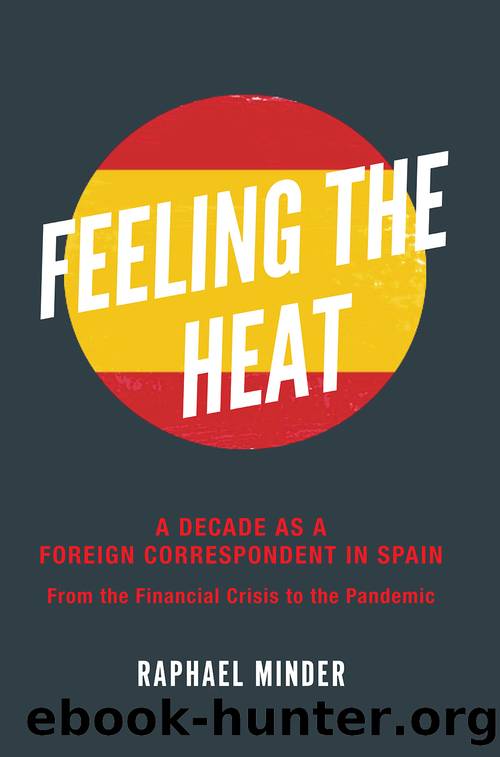Feeling the Heat in Spain a Decade as a Foreign Correspondent: From the Financial Crisis to the Pandemic by Raphael Minder

Author:Raphael Minder [Minder, Raphael]
Language: eng
Format: epub
ISBN: 9781789761498
Google: fMJ8zgEACAAJ
Publisher: Sussex Academic Press
Published: 2021-09-22T23:27:24.054109+00:00
SOCIETY
Drogas sin violencia
La vÃa de escape de Barbate en plena crisis
In 2011, I visited Barbate, a coastal town of Andalusia, to report about drugs trafficking. But the first problem I encountered there had to do with law enforcement, rather than criminality. Barbateâs main police station was filled with officers complaining that, if anyone wanted them to stop drugs, they should first get paid.
I didnât even have to speak to these policemen to know that they were disgruntled. Their frustration was posted on the walls of their police station, for any visitor to see. In the reception area, the officers had pinned a hand-written poster that read âthey owe us April,â to complain about the late payment of their salaries.
âItâs a disastrous and chaotic situation here,â Rafael Romero, one of the officers, told me, as soon as I asked him how things were going in Barbate. Romero was indignant that police officers were expected to do a good job when they were getting paid late, or possibly not at all. He also had a long list of other demands. âWe need more boats, vehicles and everything, but thereâs not even money to repair our two broken surveillance cameras,â he said. At the time, Barbate seemed to be caught in a perfect storm. The financial crisis had crippled the town hallâs finances, a faltering fishing industry was exacerbating one of Spainâs worst unemployment situations and the only profitable business in town seemed to be drugs trafficking, thanks to Barbateâs proximity to North Africa.
Only a 40-minute boat ride separates Barbate and the beaches of Morocco, from where significant quantities of drugs are sent to supply European consumers. Most of this drug is Moroccan-grown hashish, which is generally carried in light but powerful rubber boats that can ride big waves. In the nearby town of Conil, I visited a pound operated by the Guardia Civil, where the police stored vehicles under judicial investigation. In a shed, rubber boats with large outboard motors had been stacked up four-high. Since the start of the financial crisis, a Guardia Civil officer told me that the drug business was thriving. âThose who control the drugs used to have other legal businesses, but the crisis has wiped out those businesses, so theyâre back focusing on the drugs,â he said.
In Barbate, some of the frustrated police officers had harsh words for the local politicians. They blamed them for failing to acknowledge the size of the drugs problem and instead almost halve police staffing in Barbate compared to a decade earlier, as part of budgetary cuts. âI invite any politician who is claiming that the drugs problem is under control to come and tell me that to my face,â said José Manuel Jiménez, a 44-year old who had joined the local police force 15 years earlier.
Some policemen also questioned why Spain could not stop the drugs trafficking, even though an upgraded system of infrared camera surveillance had been installed along its southern coast, to monitor boats traveling from North Africa to Andalusia.
Download
This site does not store any files on its server. We only index and link to content provided by other sites. Please contact the content providers to delete copyright contents if any and email us, we'll remove relevant links or contents immediately.
| Africa | Americas |
| Arctic & Antarctica | Asia |
| Australia & Oceania | Europe |
| Middle East | Russia |
| United States | World |
| Ancient Civilizations | Military |
| Historical Study & Educational Resources |
Machine Learning at Scale with H2O by Gregory Keys | David Whiting(4295)
Never by Ken Follett(3937)
Fairy Tale by Stephen King(3370)
Oathbringer (The Stormlight Archive, Book 3) by Brandon Sanderson(3161)
The Man Who Died Twice by Richard Osman(3072)
Will by Will Smith(2911)
Rationality by Steven Pinker(2352)
Can't Hurt Me: Master Your Mind and Defy the Odds - Clean Edition by David Goggins(2324)
The Dark Hours by Michael Connelly(2300)
Friends, Lovers, and the Big Terrible Thing by Matthew Perry(2219)
The Dawn of Everything: A New History of Humanity by David Graeber & David Wengrow(2197)
Principles for Dealing With the Changing World Order: Why Nations Succeed and Fail by Ray Dalio(2042)
A Short History of War by Jeremy Black(1843)
HBR's 10 Must Reads 2022 by Harvard Business Review(1840)
Go Tell the Bees That I Am Gone by Diana Gabaldon(1754)
A Game of Thrones (The Illustrated Edition) by George R. R. Martin(1722)
Kingdom of Ash by Maas Sarah J(1668)
515945210 by Unknown(1662)
443319537 by Unknown(1546)
